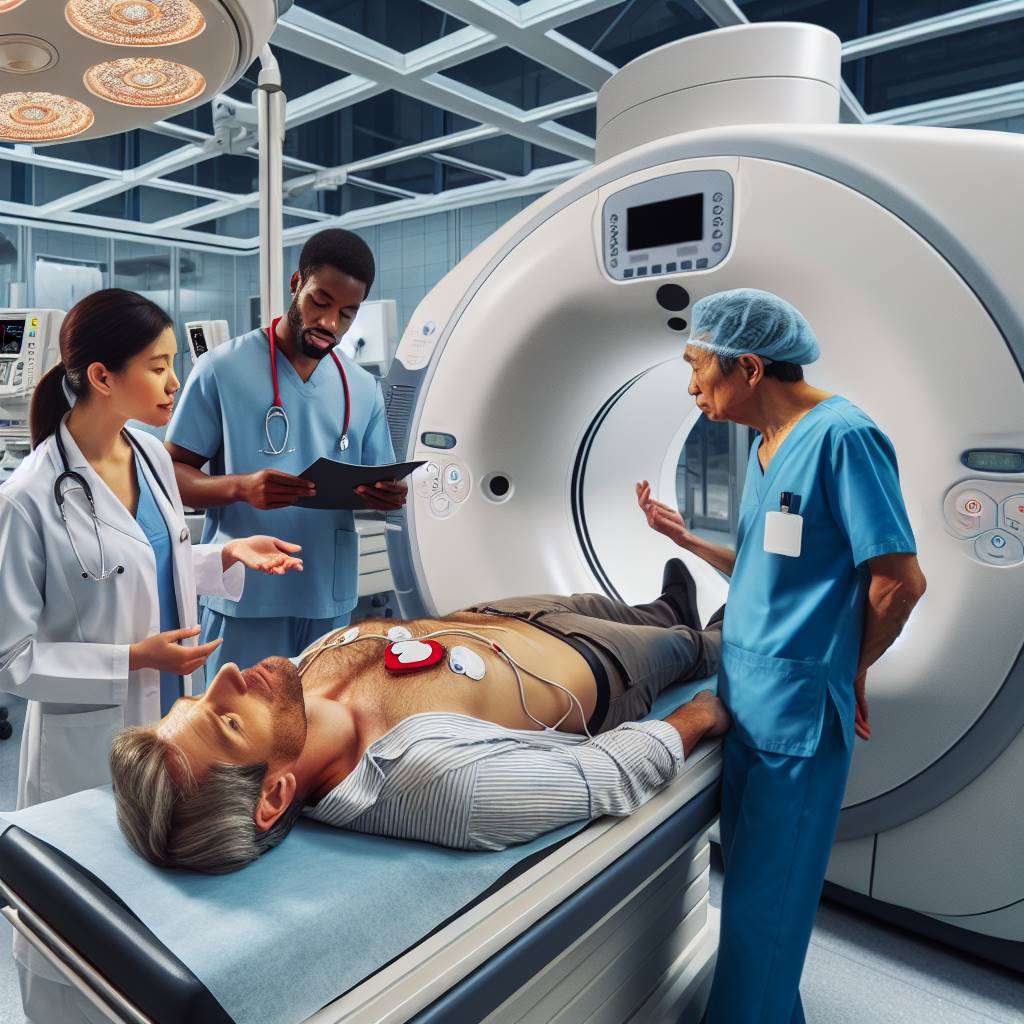Traveling with a pacemaker can raise concerns, especially when navigating airport security. Pacemakers are life-saving devices for individuals with heart rhythm disorders, but they require special precautions during air travel. Understanding how to manage airport security checks and electromagnetic interference is crucial for ensuring both safety and peace of mind.
Medical disclaimer: This content is for general awareness and does not replace a doctor’s consultation. For diagnosis or treatment decisions, consult a qualified specialist.
Airports use advanced security systems, including metal detectors and body scanners, which may interact with pacemakers. By following specific guidelines and informing security personnel, travelers with pacemakers can avoid unnecessary risks. This article provides essential tips to help patients with pacemakers travel safely and confidently, ensuring their medical device remains unaffected during their journey.
Can You Travel Safely With a Pacemaker?
Yes, individuals with a pacemaker can travel safely, including by air. Pacemakers are designed to withstand various environmental conditions, including the altitude changes experienced during flights. However, it is essential to take precautions to ensure the device functions optimally throughout the journey.
Before traveling, consult your cardiologist to confirm that your pacemaker is functioning correctly and that you are fit to travel. Carry your pacemaker identification card, as it provides critical information about your device. Additionally, ensure you have a list of emergency contacts and any medications you may need during your trip.
While traveling, avoid prolonged exposure to strong electromagnetic fields, which can interfere with the pacemaker's operation. By staying informed and prepared, you can enjoy a safe and stress-free travel experience.

Pacemakers and Airport Security: What You Should Know
Airport security systems, such as metal detectors and full-body scanners, are designed to ensure passenger safety but may pose challenges for individuals with pacemakers. Metal detectors emit electromagnetic fields that can potentially interfere with pacemaker functionality, although the risk is minimal with modern devices.
To avoid complications, inform security personnel about your pacemaker before undergoing screening. Show them your pacemaker identification card, which explains your condition and device details. Security staff are trained to handle such situations and may offer alternative screening methods, such as a manual pat-down.
Remember, handheld metal detectors should not be placed directly over your pacemaker for extended periods. By communicating effectively with airport staff, you can ensure a smooth and safe security check process.
How to Prepare for Air Travel With a Pacemaker
Proper preparation is key to traveling safely with a pacemaker. Start by scheduling a pre-travel consultation with your cardiologist to ensure your device is functioning correctly. Discuss any potential risks and obtain a copy of your recent medical records, which can be helpful in case of emergencies.
Pack a travel kit that includes your pacemaker identification card, a list of medications, and emergency contact numbers. If you rely on specific medications, carry an adequate supply in your hand luggage to avoid disruptions during your trip.
- Inform the airline about your medical condition in advance.
- Request special assistance if needed, such as wheelchair services.
- Stay hydrated and avoid excessive physical exertion during travel.
By taking these steps, you can minimize risks and enjoy a comfortable journey.
Do Metal Detectors Affect Pacemakers at Airports?
Metal detectors at airports emit low-frequency electromagnetic fields, which can interact with pacemakers. However, modern pacemakers are designed to resist such interference, making the risk of malfunction extremely low. That said, prolonged exposure to these fields should still be avoided.
If you pass through a metal detector, do so quickly and inform security personnel about your pacemaker beforehand. Handheld metal detectors, when used, should not be held directly over the pacemaker for extended periods. This precaution minimizes the chance of interference.
If you are concerned about the effects of metal detectors, request an alternative screening method, such as a manual pat-down. By understanding the potential risks and taking appropriate measures, you can ensure your pacemaker remains unaffected during airport security checks.
Pacemaker Safety Tips for Airport Security Scanners
Navigating airport security scanners with a pacemaker requires careful planning. Full-body scanners, which use millimeter-wave technology, are generally safe for pacemaker patients. However, it is still advisable to inform security personnel about your device before undergoing any screening.
Here are some essential tips for pacemaker safety at airport security:
- Carry your pacemaker identification card at all times.
- Inform security staff about your medical device before screening.
- Request a manual pat-down if you are uncomfortable with scanners.
- Avoid prolonged exposure to handheld metal detectors.
By following these guidelines, you can ensure a smooth and safe airport security experience while protecting your pacemaker from potential interference.
What to Tell Airport Staff About Your Pacemaker
When traveling with a pacemaker, it is important to inform airport staff about your medical device before undergoing security screening. Pacemakers are sensitive to certain types of electromagnetic interference, which can occur during security checks. By notifying the staff, you can ensure that alternative screening methods are used to avoid any potential issues.
Always carry your pacemaker identification card and show it to the security personnel. This card provides essential details about your device, including the manufacturer and model. Additionally, you can request a manual pat-down instead of walking through a metal detector or full-body scanner, as these devices may interfere with your pacemaker's function.
Communicating clearly with airport staff ensures a smooth and safe screening process, protecting both your health and your travel experience.

Flying With a Pacemaker: Essential Safety Guidelines
Flying with a pacemaker is generally safe, but there are a few precautions you should take to ensure your journey is comfortable and stress-free. First, consult your cardiologist before traveling to confirm that you are fit to fly. They may provide specific advice based on your health condition and pacemaker type.
During the flight, stay hydrated and move around periodically to prevent blood clots, especially on long-haul flights. If you experience symptoms like dizziness, chest pain, or irregular heartbeats, inform the flight crew immediately. Carry all your medications in your hand luggage, along with your pacemaker identification card.
- Inform the airline about your medical condition in advance.
- Avoid sitting near strong electromagnetic sources, such as certain electronic devices.
- Keep emergency contact numbers handy.
By following these guidelines, you can enjoy a safe and pleasant flight experience.
How to Handle TSA Screening With a Pacemaker
Passing through TSA screening with a pacemaker requires some extra care. Metal detectors and full-body scanners emit electromagnetic waves that might interfere with your device. To avoid this, inform the TSA agents about your pacemaker before the screening process begins.
Request a manual pat-down instead of walking through the scanner. TSA agents are trained to handle such requests and will ensure your screening is done safely. If you must pass through a metal detector, do so quickly and avoid lingering near the machine.
Carry your pacemaker ID card and any relevant medical documents to facilitate the process. Remember, your safety is a priority, and TSA agents are there to assist you.
Traveling Abroad With a Pacemaker: Key Considerations
Traveling internationally with a pacemaker requires additional planning to ensure a smooth trip. Start by consulting your doctor to confirm that you are fit for travel and to obtain any necessary medical clearance. Research the healthcare facilities available at your destination in case of emergencies.
Carry a list of your medications and their generic names, as brand names may vary in different countries. Ensure that your pacemaker identification card is translated into the local language if needed. Additionally, check the airline's policies regarding medical devices and inform them about your condition in advance.
Keep a travel insurance policy that covers pre-existing conditions, including pacemaker-related issues. With proper preparation, you can enjoy your trip without unnecessary stress.
Pacemaker Identification Cards: Why You Need One
A pacemaker identification card is an essential document for anyone with a pacemaker. This card contains critical information about your device, such as the manufacturer, model, and serial number. It also includes details about your cardiologist and emergency contact information.
Having this card is especially important during airport security checks, as it helps you communicate your medical condition to the staff. It can also be invaluable in medical emergencies, allowing healthcare providers to quickly understand your condition and provide appropriate care.
Always keep your pacemaker ID card in your wallet or a secure, easily accessible place. If you are traveling abroad, consider carrying a translated version of the card to avoid language barriers. This small document can make a big difference in ensuring your safety and peace of mind.
Can Full-Body Scanners Interfere With Pacemakers?
Many people with pacemakers worry about the effects of airport full-body scanners on their devices. Modern pacemakers are designed to withstand low levels of electromagnetic interference, including those emitted by scanners. However, it’s always best to inform security personnel about your device.
Full-body scanners use millimeter-wave technology, which is generally safe for medical implants. However, older pacemakers or those with specific settings may be more sensitive. To ensure safety, carry your pacemaker ID card and request a manual pat-down if you feel uncertain.
Always consult your cardiologist before traveling to understand any specific precautions you should take. Being proactive can help you avoid unnecessary stress and ensure a smooth security process.

Medical Advice for Frequent Flyers With Pacemakers
Frequent flyers with pacemakers should take extra precautions to ensure their health and safety while traveling. Before your trip, consult your cardiologist to confirm that air travel is safe for you and to discuss any specific recommendations.
It’s essential to stay hydrated during flights, as dehydration can affect your heart’s function. Avoid excessive caffeine or alcohol, as these can increase your heart rate. If you’re on medication, pack enough for the entire trip and keep it in your carry-on luggage.
Inform the airline about your medical condition if you require special assistance. Many airlines are equipped to accommodate passengers with medical devices, ensuring a comfortable journey. Always prioritize your health and plan ahead for a stress-free experience.
What Pacemaker Patients Should Pack for Air Travel
Proper packing is crucial for pacemaker patients to ensure a safe and comfortable trip. Always carry your pacemaker ID card, as it helps security personnel understand your condition and allows for alternative screening methods.
Pack a small travel kit with essential items, including:
- Your regular medications and a copy of your prescriptions.
- A list of emergency contacts, including your doctor’s details.
- Comfortable clothing and any medical supplies you may need.
Keep all medical items in your carry-on luggage to avoid delays or issues if your checked baggage is lost. Planning ahead ensures you’re prepared for any situation during your travels.
How to Avoid Pacemaker Interference During Security Checks
Security checks at airports can be a concern for pacemaker patients due to potential electromagnetic interference. To minimize risks, inform the security staff about your pacemaker before the screening process begins.
Request a manual pat-down instead of walking through metal detectors or full-body scanners. While these devices are generally safe, it’s better to err on the side of caution. Carrying your pacemaker ID card can expedite this process.
Additionally, avoid standing near security equipment for extended periods. If you experience any unusual symptoms, such as dizziness or irregular heartbeats, notify the staff immediately and seek medical attention if necessary.
Expert Tips for Stress-Free Travel With a Pacemaker
Traveling with a pacemaker doesn’t have to be stressful if you follow some expert tips. First, plan your trip well in advance and consult your doctor to ensure you’re fit to travel. Discuss any adjustments to your medication schedule if crossing time zones.
Stay informed about your destination’s healthcare facilities in case of emergencies. Carry a detailed medical history and your pacemaker ID card at all times. During the flight, move around periodically to improve circulation and reduce the risk of blood clots.
Finally, maintain a positive mindset and focus on enjoying your journey. With proper planning and precautions, you can travel confidently and safely with a pacemaker.
Best Pacemaker Surgery Doctors in India
Dr. Balbir Singh, a renowned cardiologist at Medanta - The Medicity, Gurugram, specializes in electrophysiology with over 30 years of experience. Another expert is Dr. T. S. Kler, Chairman at Fortis Escorts Heart Institute, Delhi, with over 35 years of expertise in cardiac pacing and international recognition for his contributions to electrophysiology.
Learn more on best pacemaker implantation surgery doctors in india
Best Pacemaker Surgery Hospitals in India
Fortis Escorts Heart Institute, Delhi, a NABH-accredited hospital, is known for advanced cardiac care and international patient services. Medanta - The Medicity, Gurugram, a JCI-accredited hospital, excels in multidisciplinary care and robotic cardiac procedures. Both hospitals have a strong track record of successful pacemaker implantations.
Find more best pacemaker implantation surgery hospitals in india
Pacemaker Surgery Cost in India
The cost of pacemaker implantation in India typically ranges from INR 2,00,000 to INR 5,00,000 (approximately USD 2,500 to USD 6,000). Factors influencing costs include the type of pacemaker, hospital category, and doctor’s expertise. The average hospital stay is 2-3 days. India offers a significant cost advantage compared to Western countries, with medical insurance and financing options available.
Learn pacemaker implantation surgery cost in india
Pacemaker Surgery Treatment in India
Pacemaker implantation in India involves placing the device under the skin near the chest, with leads connected to the heart. Advanced techniques like minimally invasive surgery and robotic assistance are used in leading hospitals. Recovery typically takes 1-2 weeks. Indian hospitals adhere to global medical protocols and offer cutting-edge technologies for optimal outcomes.
Learn on Pacemaker Surgery Treatment in India
FAQs
Can I pass through airport security with a pacemaker?
Yes, you can pass through airport security, but you should inform the security personnel about your pacemaker. Avoid prolonged exposure to metal detectors and request a manual pat-down if necessary.
Will airport scanners damage my pacemaker?
No, modern pacemakers are designed to withstand airport scanners. However, prolonged exposure to electromagnetic fields should be avoided. Always carry your pacemaker ID card for reference.
Do I need to carry any documents while traveling with a pacemaker?
Yes, carry your pacemaker ID card, medical records, and a letter from your doctor explaining your condition and device details. These documents can help in case of emergencies or during security checks.
Can I travel internationally with a pacemaker?
Yes, you can travel internationally with a pacemaker. Ensure you consult your doctor before traveling, carry necessary medications, and be aware of healthcare facilities at your destination.
Are there any restrictions on flying with a pacemaker?
There are no specific restrictions on flying with a pacemaker. However, avoid flying immediately after implantation surgery and follow your doctor’s advice regarding travel readiness.
What should I do if I feel unwell during a flight?
If you feel unwell during a flight, inform the cabin crew immediately. They are trained to handle medical emergencies and can assist you in seeking medical help upon landing.
Can I use electronic devices on a plane with a pacemaker?
Yes, most electronic devices are safe to use with a pacemaker. However, avoid keeping devices like mobile phones or tablets directly over your chest where the pacemaker is implanted.
How can I prepare for a long journey with a pacemaker?
For long journeys, ensure you carry all necessary medications, stay hydrated, and take breaks to move around if possible. Consult your doctor for specific travel advice based on your condition.
Are there any activities I should avoid while traveling with a pacemaker?
Avoid activities that expose you to strong electromagnetic fields or high altitudes without pressurization. Consult your doctor for a list of activities that may not be suitable for your condition.
What should I do in case of a pacemaker malfunction while traveling?
If you suspect a pacemaker malfunction, seek immediate medical attention. Carry your pacemaker ID card and contact details of your cardiologist to assist local healthcare providers.
The Future of Cardiac Care: Innovations in Pacemaker Technology
As technology continues to evolve, the field of cardiology is witnessing groundbreaking advancements, particularly in pacemaker technology. One of the most significant developments is the integration of AI and smart technology in pacemaker programming. This innovation enhances the customization of cardiac devices, allowing for more precise monitoring and adjustments tailored to individual patient needs. To learn more about this transformative approach, check out our article on how AI and smart technology are changing pacemaker programming.
Additionally, the emergence of leadless pacemakers marks a new era in cardiac care. These devices offer a less invasive option for patients, eliminating the need for leads that can complicate traditional pacemaker implantation. This advancement not only improves patient comfort but also reduces the risk of complications associated with lead placement. For further insights into this innovative technology, read our blog on leadless pacemakers.
In conclusion, the combination of AI advancements and leadless technology is revolutionizing how we approach cardiac care, promising better outcomes and enhanced patient experiences.